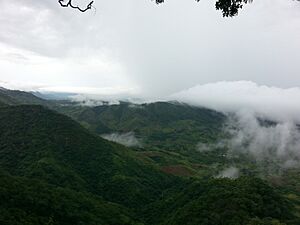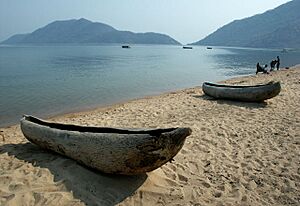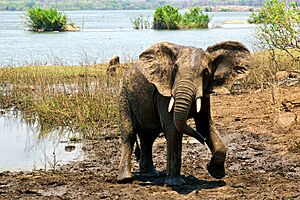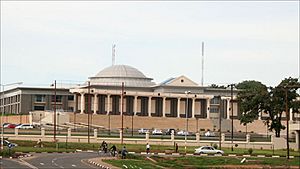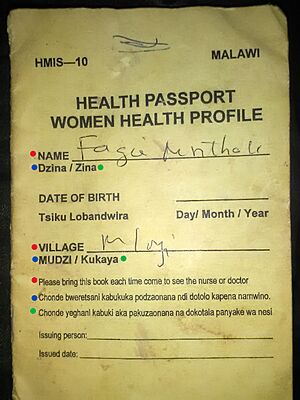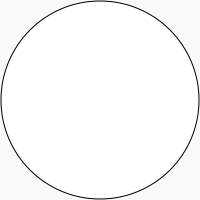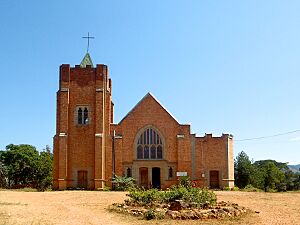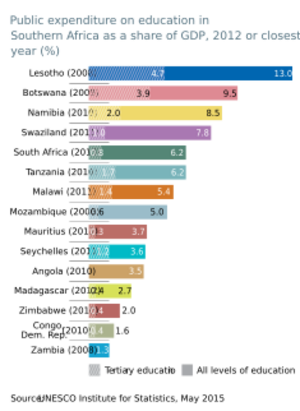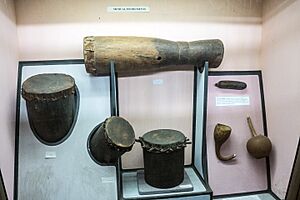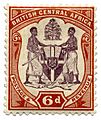Malawi facts for kids
Quick facts for kids
Republic of Malawi
Dziko la Malaŵi (Chichewa)
Charu cha Malaŵi (Chitumbuka) |
|
|---|---|
|
|
|
|
Motto: "Unity and Freedom"
|
|
|
Anthem: Mlungu dalitsani Malaŵi (Chichewa)
("O God Bless Our Land of Malawi") |
|
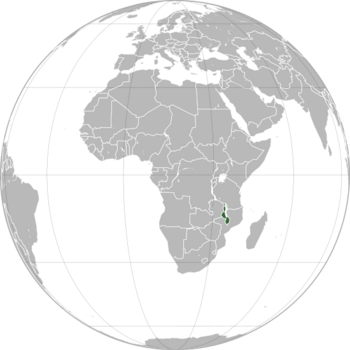
Location of Malawi (dark green) in southeast Africa
|
|
| Capital and largest city
|
Lilongwe 13°57′S 33°42′E / 13.950°S 33.700°E |
| Official languages | |
| Recognised regional languages |
|
| Ethnic groups
(2018 census)
|
|
| Religion
(2018 census)
|
|
| Demonym(s) | Malawian |
| Government | Unitary presidential republic |
| Lazarus Chakwera | |
| Michael Usi | |
|
• House Speaker
|
Catherine Gotani Hara |
| Legislature | National Assembly |
| Independence
from the United Kingdom
|
|
|
• Dominion
|
6 July 1964 |
|
• Republic
|
6 July 1966 |
| Area | |
|
• Total
|
118,484 km2 (45,747 sq mi) (98th) |
|
• Water (%)
|
20.6% |
| Population | |
|
• 2024 estimate
|
|
|
• 2018 census
|
17,563,749 |
|
• Density
|
153.1/km2 (396.5/sq mi) (56th) |
| GDP (PPP) | 2023 estimate |
|
• Total
|
|
|
• Per capita
|
|
| GDP (nominal) | 2023 estimate |
|
• Total
|
|
|
• Per capita
|
|
| Gini (2016) | ▲ 44.7 medium |
| HDI (2022) | low · 172nd |
| Currency | Malawian kwacha (D) (MWK) |
| Time zone | UTC+2 (CAT) |
| Date format | dd/mm/yyyy |
| Driving side | left |
| Calling code | +265 |
| ISO 3166 code | MW |
| Internet TLD | .mw |
|
* Population estimates for this country explicitly take into account the effects of excess mortality due to AIDS; this can result in lower life expectancy, higher infant mortality and death rates, lower population and growth rates, and changes in the distribution of population by age and sex than would otherwise be expected.
|
|
Malawi (Republic of Malawi) is a country in south-east Africa. It has borders with the countries of Tanzania, Zambia, and Mozambique. The capital of Malawi is Lilongwe and the spoken languages are English and Chichewa. The official language of Malawi is English. The total size is about 118480 km² and there are about 100 people per km². The country is also called "The Warm Heart of Africa". Malawi is one of the smallest countries in Africa. Lake Malawi takes about a third of Malawi's area.
Bantu people started living in Malawi in the 10th century. In 1891 the area became a colony of the United Kingdom. In 1953 Malawi, then called as Nyasaland, as a protectorate of the United Kingdom, became an almost independent country called Federation of Rhodesia and Nyasaland. The Federation was ended in 1963. In 1964 the protection of the United Kingdom over Nyasaland was ended. Nyasaland became an independent country which was ruled by Queen Elizabeth and was called Malawi. Two years later it became a republic. After getting independence it became a one-party rule which was ruled by Hastings Banda. He was president until 1994. Peter Mutharika is the current president. Malawi has a democratic, many party government. Malawi has a small military: army, a navy and an air support. Malawi has good relations with Western countries and most countries in the world. Malawi has joined some international organizations.
Malawi is one of the poorest countries in the world. Economy is based in farming. Most of the population live in field areas. Country gets aid from other countries. Government has a hard time building and expanding the economy and develop health care, education and environment safety. Since 2005 some programs have been developed to focus on these problems.
Malawi has a low life expectancy and high infant mortality. People become ill with AIDS. Africans, Asians and Europeans are living in the country and they speak in different languages.
Contents
Etymology
The first name given to what is known now as Malawi was Nyasaland, a combination of the Lomwe word nyasa "lake" and the English word "land". The combined name was formed by David Livingstone, a Scottish explorer and missionary who led the legendary Zambezi Expedition through the area in the mid-1800s. The current name Malawi, meaning "flames" in Chichewa and Chitumbuka, was chosen by the first president of Malawi, Kamuzu Banda, after the country achieved its independence from Great Britain in 1964.
History
People have lived in the area of Malawi for thousands of years. At first they were hunter-gatherers. Bantu groups came to the area around the 10th century. Most of the Bantu groups went to south but some started living there and made ethnic groups based on familiar race.
By 1500 AD groups came together and made Maravi empire, which streched from north of what is now Nkhotakota to the Zambezi River and from Lake Malawi to the Luangwa River in what is now Zambia.
After 1600 the area was united under one ruler and began trading and making connection with Portuguese traders and members of the military through the Mozambican port which was occupied by Portuguese. By 1700 the empire had broken up into areas that were controlled by individual groups of people which was known by the Portuguese by collecting information. The Swahili-Arab slave trade had its highest amount in the middle of 1800s when about 20,000 people were forced to become slaves and were sold every year.
In 1859 British explorer David Livingstone found Lake Malawi (then it was called Lake Nyasa) and thought that Shire Highlands to the south of the lake was a good place for Europeans to make a colony. Many British missions were done in the area in the 1860s and 1870s. The African Lakes Company Limited was made in 1878 to set up a trade and transport that helped with the missions, and a small mission and trading area was made at Blantyre in 1876 and a British Consul started living there in 1883.
Malawi became an independent country in 6 July 1964. Hastings Banda became the first president. Constitution made Malawi become a republic and one-party state. Banda's Malawi Congress Party (MCP) was the only legal party in the country. In 1971, Banda became president for life. For almost 30 years, Banda ruled over a harsh government which kept Malawi out from war.
Banda showed how a poor country with no access to sea, big population and no minerals can develop farming and industries. Banda made a business empire that produced one-third of the country's GDP and used 10% of the workers who got paid. All money made by Banda was used to develop Malawi.
Under pressure for free politics, Banda held an referendum in 1993, where population voted for many party, democratic government. In late 1993 a presidential council was made, president for life was ended and new constitution was put in place, ending MCP rule. In 1994 the first many party elections were held in Malawi, and Banda was defeated by Bakili Muluzi.
Geography
Malawi is a landlocked country in southeastern Africa, bordered by Zambia to the northwest, Tanzania to the northeast, and Mozambique to the south, southwest, and southeast. It lies between latitudes 9° and 18°S, and longitudes 32° and 36°E. The Great Rift Valley runs through the country from north to south, and to the east of the valley lies Lake Malawi (also called Lake Nyasa), making up over three-quarters of Malawi's eastern boundary. Lake Malawi is sometimes called the Calendar Lake as it is about 365 miles (587 km) long and 52 miles (84 km) wide. The Shire River flows from the south end of the lake and joins the Zambezi River 400 kilometres (250 mi) farther south in Mozambique. The surface of Lake Malawi is at 457 metres (1,500 ft) above sea level, with a maximum depth of 701 metres (2,300 ft), which means the lake bottom is over 213 metres (700 ft) below sea level at some points.
In the mountainous sections of Malawi surrounding the Rift Valley, plateaus rise generally 914 to 1,219 metres (3,000 to 4,000 ft) above sea level, although some rise as high as 2,438 metres (8,000 ft) in the north. To the south of Lake Malawi lies the Shire Highlands, gently rolling land at approximately 914 metres (3,000 ft) above sea level. In this area, the Zomba and Mulanje mountain peaks rise to respective heights of 2,134 and 3,048 metres (7,000 and 10,000 ft).
Malawi's capital is Lilongwe, and its commercial centre is Blantyre, with a population of over 500,000 people. Malawi has two sites listed on the UNESCO World Heritage List. Lake Malawi National Park was first listed in 1984, and the Chongoni Rock Art Area was listed in 2006.
Malawi's climate is hot in the low-lying areas in the south of the country and temperate in the northern highlands. The altitude moderates what would otherwise be an equatorial climate. Between November and April, the temperature is warm with equatorial rains and thunderstorms, with the storms reaching their peak severity in late March. After March, the rainfall rapidly diminishes, and from May to September, wet mists float from the highlands into the plateaus, with almost no rainfall during these months.
Flora and fauna
Animal life indigenous to Malawi includes mammals such as elephants, hippos, antelopes, buffaloes, big cats, monkeys, rhinos, and bats; a great variety of birds, including birds of prey, parrots, and falcons; waterfowl and large waders; and owls and songbirds. Lake Malawi has been described as having one of the richest lake fish faunas in the world, being the home for some 200 mammals, 650 birds, 30+ mollusk, and 5,500+ plant species.
Seven terrestrial ecoregions lie within Malawi's borders: Central Zambezian miombo woodlands, Eastern miombo woodlands, Southern miombo woodlands, Zambezian and mopane woodlands, Zambezian flooded grasslands, South Malawi montane forest-grassland mosaic, and Southern Rift montane forest-grassland mosaic. There are five national parks, four wildlife and game reserves and two other protected areas in Malawi. The country had a 2019 Forest Landscape Integrity Index mean score of 5.74/10, ranking it 96th globally out of 172 countries.
Government
Malawi is a unitary presidential republic. The current constitution was put into place on 18 May 1995. The branches of the government consist of executive, legislative, and judicial. The executive includes a President who is both Head of State and Head of Government, first and second Vice Presidents, and the Cabinet of Malawi. The President and Vice President are elected together every five years. A second Vice President may be appointed by the President if so chosen, although they must be from a different party. The members of the Cabinet of Malawi are appointed by the President and can be from either inside or outside of the legislature.
The legislative branch consists of a unicameral National Assembly of 193 members who are elected every five years, and although the Malawian constitution provides for a Senate of 80 seats, one does not exist in practice. If created, the Senate would provide representation for traditional leaders and a variety of geographic districts, as well as special interest groups, including the disabled, youth, and women. The Malawi Congress Party is the ruling party together with several other parties in the Tonse Alliance led by Lazarus Chakwera while the Democratic Progressive Party is the main opposition party. Suffrage is universal at 18 years of age, and the central government budget for 2021/2022 is $2.4 billion from $2.8 billion for the 2020/2021 financial year.
The independent judicial branch is based upon the English model and consists of a Supreme Court of Appeal, a High Court divided into three sections (general, constitutional, and commercial), an Industrial Relations Court and Magistrates Courts, the last of which is divided into five grades and includes Child Justice Courts. The judicial system has been changed several times since Malawi gained independence in 1964. Conventional courts and traditional courts have been used in varying combinations, with varying degrees of success and corruption.
Malawi is composed of three regions (the Northern, Central, and Southern regions), which are divided into 28 districts, and further into approximately 250 traditional authorities and 110 administrative wards. Local government is administered by central government-appointed regional administrators and district commissioners.
Administrative divisions
Malawi is divided into 28 districts within three regions:
|
Central Region
|
Northern Region
|
Southern Region
|
Economy
Malawi is among the world's least developed countries. Around 85% of the population lives in rural areas. The economy is based on agriculture, and more than one-third of GDP and 90% of export revenues come from this.
Agriculture accounts for 35% of GDP, industry for 19%, and services for the remaining 46%. Malawi has one of the lowest per capita incomes in the world.
Demographics
Population
Malawi has a population of over 18 million, with a growth rate of 3.32%, according to 2018 estimates. The population is forecast to grow to over 47 million people by 2050, nearly tripling the estimated 16 million in 2010. Malawi's estimated 2016 population is, based on most recent estimates, 18,091,575.
Ethnic groups
| Ethnic Groups in Malawi (2018 census) | ||||
|---|---|---|---|---|
| Ethnic Groups | per cent | |||
| Chewa | 34.4% | |||
| Lomwe | 18.9% | |||
| Yao | 14.3% | |||
| Tumbuka | 22.2% | |||
| Sena | 3.8% | |||
| Mang'anja | 3.2% | |||
| Nyanja | 1.9% | |||
| Tonga | 1.8% | |||
| Ngonde | 1% | |||
| Lambya | 0.6% | |||
| Sukwa | 0.5% | |||
| Other | 1.1% | |||
Malawi's population is made up of the Chewa, Tumbuka, Yao, Lomwe, Sena, Tonga, Ngoni, and Ngonde native ethnic groups, as well as populations of Chinese and Europeans.
Languages
| Languages of Malawi (1998 Census) | ||||
|---|---|---|---|---|
| Languages | per cent | |||
| Chichewa | 57.2% | |||
| Chinyanja | 12.8% | |||
| Chiyao | 10.1% | |||
| Chitumbuka | 9.5% | |||
| Chisena | 2.7% | |||
| Chilomwe | 2.4% | |||
| Chitonga | 1.7% | |||
| Chinkhonde | 0.8% | |||
| Chingoni | 0.7% | |||
| Chilambya | 0.4% | |||
| Chisenga | 0.2% | |||
| Chinyakyusa | 0.2% | |||
| English | 0.2% | |||
| Other | 1.1% | |||
The official language is English.
Major languages include Chichewa, a Bantu language spoken by over 41% of the population, Chitumbuka (28.2%), Chinyanja (12.8%), and Chiyao (16.1%). Other native languages are Malawian Lomwe, spoken by around 250,000 in the southeast of the country; Kokola, spoken by around 200,000 people also in the southeast; Lambya, spoken by around 45,000 in the northwestern tip; Ndali, spoken by around 70,000; Nyakyusa-Ngonde, spoken by around 300,000 in northern Malawi; Malawian Sena, spoken by around 270,000 in southern Malawi; and Tonga, spoken by around 170,000 in the north.
All students in public elementary school receive instruction in Chichewa, which is described as the unofficial national language of Malawi. Students in private elementary schools, however, receive instruction in English if they follow the American or British curriculum.
Religion
Religion in Malawi (2018) Christianity (77.3%) Islam (13.8%) Traditional (1.1%) Other or none (7.8%)
Malawi is a majority Christian country, with a significant Muslim minority. There are also smaller numbers of Anglicans, Baptists, evangelicals, Seventh-day Adventists, and Lutherans.
Most of the Muslim population is Sunni, of either the Qadriya or Sukkutu groups. Other religious groups within the country include Jehovah's Witnesses (over 100,000), The Church of Jesus Christ of Latter-day Saints, with just over 2,000 members in the country at the end of 2015, Rastafari, Hindus, and Baháʼís (0.2%). Atheists make up around 4% of the population, although this number may include people who practice traditional African religions that do not have any gods.
Education
In 1994, free primary education for all Malawian children was established by the government, and primary education has been compulsory since the passage of the Revised Education Act in 2012. As a result, enrollment rates for primary schools went up from 58% in 1992 to 75% in 2007. The percentage of students who begin standard one and complete standard five has increased from 64% in 1992 to 86% in 2006. According to the World Bank, youth literacy had also increased from 68% in 2000 to 75% in 2015. This increase is primarily attributed to improved learning materials in schools, better infrastructure and feeding programs that have been implemented throughout the school system. However, attendance in the secondary school falls to approximately 25%, with attendance rates being slightly higher for males. Dropout rates are higher for girls than boys.
Education in Malawi comprises eight years of primary education, four years of secondary school and four years of university. There are four public universities in Malawi: Mzuzu University (MZUNI), Lilongwe University of Agriculture and Natural Resources (LUANAR), the University of Malawi (UNIMA) and Malawi University of Science and Technology (MUST). There are also private universities, such as Livingstonia, Malawi Lakeview, and Catholic University of Malawi. The entry requirement is six credits on the Malawi School Certificate of Education, which is equivalent to O levels.
Culture
The name "Malawi" comes from the Maravi, a Bantu ethnic group who emigrated from the southern Congo around 1400 AD. Over the past century, ethnic distinctions have diminished to the point where there is no significant inter-ethnic friction, although regional divisions still occur. The concept of a Malawian nationality has begun to form around predominantly rural people who are generally conservative and traditionally nonviolent. The "Warm Heart of Africa" nickname was given to the country due to the perceived loving nature of the Malawian people.
From 1964 to 2010, and again since 2012, the flag of Malawi is made up of three equal horizontal stripes of black, red, and green with a red rising sun superimposed in the center of the black stripe. The black stripe represented the African people, the red represented the blood of martyrs for African freedom, green represented Malawi's ever-green nature and the rising sun represented the dawn of freedom and hope for Africa. In 2010, the flag was changed, removing the red rising sun and adding a full white sun in the centre as a symbol of Malawi's economic progress. The change was reverted in 2012.
The National Dance Troupe (formerly the Kwacha Cultural Troupe) was formed in November 1987 by the government. Traditional music and dances can be seen at initiation rites, rituals, marriage ceremonies and celebrations. The indigenous ethnic groups of Malawi have a tradition of basketry and mask carving. Wood carving and oil painting are also popular in more urban centres, with many of the items produced being sold to tourists. There are several internationally recognised literary figures from Malawi, including poet Jack Mapanje, history and fiction writer Paul Zeleza and authors Legson Kayira.
Sports
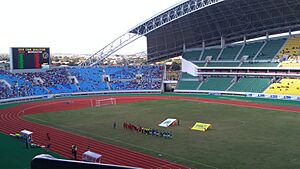
Football is the most common sport in Malawi, introduced there during British colonial rule. Its national team has failed to qualify for a World Cup so far but has made three appearances in the Africa Cup of Nations. Football teams include the Mighty Wanderers, Big Bullets, Silver Strikers, Blue Eagles, Civo Sporting, Moyale Barracks, and Mighty Tigers. Basketball is also growing in popularity, but its national team is yet to participate in any international competition. More success has been found in netball, with the Malawi national netball team ranked 6th in the world (as of March 2021).
Cuisine
Malawian cuisine is diverse, with tea and fish being popular features of the country's cuisine. Sugar, coffee, corn, potatoes, sorghum, cattle, and goats are also important components of the cuisine and economy. Lake Malawi is a source of fish, including chambo (similar to bream), usipa (similar to sardines), and mpasa (similar to salmon and kampango). Nsima is a food staple made from ground corn and typically served with side dishes of meat and vegetables. It is commonly eaten for lunch and dinner.
Related pages
Images for kids
-
1897 British Central Africa stamp issued by the United Kingdom
-
Malawi's first Prime Minister and later the first President, Hastings Banda (left), with Tanzania's President Julius Nyerere
-
Harvesting groundnuts at an agricultural research station in Malawi
-
Children attending a farmer meeting in Nalifu village, Mulanje
-
Bingu National Stadium in Lilongwe.
See also
 In Spanish: Malaui para niños
In Spanish: Malaui para niños




